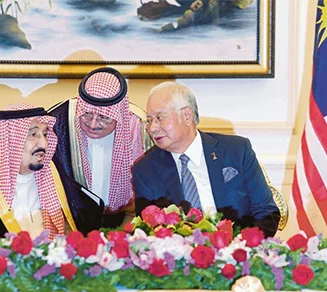Around this time last year, Prime Minister Datuk Seri Najib Razak was in Saudi Arabia to visit and support Malaysians involved in the Northern Thunder exercise. It was Malaysia’s first time participating in this exercise wholly dominated by Middle Eastern and African states.
Fast forward to the same time this year, Saudi Arabia ruler King Salman Abdulaziz Al-Saud embarked on a month-long Asian tour with Malaysia as his first stop.
King Salman’s visit to Malaysia was the talk of the town, mostly for two reasons: the fact that His Majesty rarely travels due to his age, and, the size of his entourage, rumoured to be more than 500 people.
During King Salman’s visit to Malaysia, six memoranda of understanding (MoUs) were signed. This included the Petronas-Aramco deal that had been kept under wraps until a day or two before King Salman’s visit. Although the main focus of the visit was on strengthening economic and business ties, His Majesty’s visit to Malaysia also introduced the King Salman Centre for International Peace — a “soft power” mechanism aimed at combating terrorism. The announcement recognised Malaysia’s ability to successfully curb terrorist attacks that have rapidly increased in the past couple of years.
The establishment of the King Salman Centre for International Peace will add another dimension to Malaysia’s efforts at combating terrorism beyond, among many others, Malaysia’s membership of the Islamic Military Alliance to Fight Terrorism announced by the Saudi government in 2015. Malaysia, of course, already hosts the Southeast Asia Regional Centre for Counter Terrorism (SEARCCT), a centre for training and building the capacity of enforcement and security officials from governments and international organisations in combating and curbing the threat of terrorism in the region.
However, in light of the growing use of technology by militants as well as their supporters and sympathisers, there has been increasing focus on countering extreme digital messages in Malaysia. To this initiative, a number of initiatives have been launched, including a much vaunted Regional Digital Counter Messaging Centre (RDC3).
A week after King Salman’s visit, Malaysia underscored the seriousness of the terror threat by releasing news of a thwarted attack on King Salman and his entourage reportedly planned by four Yemenis, two Malaysians and one Indonesian.
Authorities stated that the four Yemenis belong to a Houthi insurgency group backed by Iranians in the Yemeni war. The Malaysian police managed to arrest the would-be attackers “in the nick of time”, said Inspector-General of Police (IGP) Tan Sri Khalid Abu Bakar.
Military cooperation was also widened on the sidelines of King Salman’s visit. This was evident through the agreements made between both countries’ air and naval forces. The Royal Malaysian Air Force (RMAF) will be recipient to the itemisation of surplus assets from the Saudi Air Force (SAF), although details are pending. As well, the Royal Malaysian Navy (RMN) will be cooperating with its Saudi counterpart, the Royal Saudi Navy (RSNF).
The RMN is expected to share its experience and expertise in an advisory and training capacity in submarine operations to boost the RSNF’s strategic capability. The RSNF is expected to include submarines in its future fleet.
In the past two years, Malaysia has participated in Northern Thunder — one of the largest defence exercises involving 20 nations from the Middle East, Africa and Asia.
Najib explained last year that Malaysia’s participation aimed to send a strong signal of support for Saudi Arabia’s security. The Defence Ministry underscored that the exercise provided an opportunity for Malaysian forces to prepare themselves for exigencies, including transporting remaining Malaysians in Yemen if necessary, and to train in a vastly different environment.
There is clear indication that the bilateral relationship between Saudi Arabia and Malaysia will continue to strengthen given the personalities that dictate increasingly warming bilateral relations, particularly between Malaysian Defence Minister Datuk Seri Hishammuddin Hussein and the Deputy Crown Prince of Saudi Arabia Prince Mohamad Salman.
The convergence of interests in combating and curbing the rise of terrorism and false Islamic narratives will likely drive the security aspect of this relationship as economic ties continue to grow.
Article by Tengku Nur Qistina Petri which appeared in New Straits Times, March 14, 2017.





